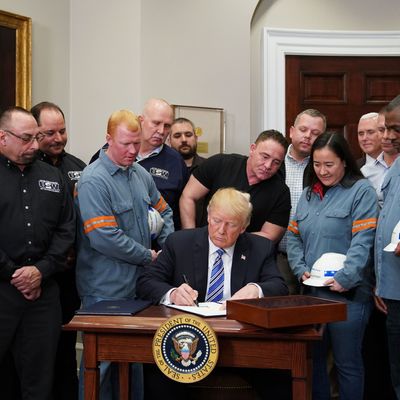
One week ago, Donald Trump announced that he would be slapping hefty tariffs on steel and aluminum imports to the United States. He did not specify whether these duties would apply to imports from all foreign countries without exception. And his administration was unable to clarify this point because the president publicized the policy before he’d given the White House staff, government lawyers — or officials at the departments of State, Treasury, or Defense — an opportunity to weigh in on the measure, or hammer out its details.
For days, all America’s allies had to go on were Trump tweets; and those did not evince an appetite for accommodation. As administration officials worked to rebut the idea that the president’s tariffs would spark a trade war, Trump cheered one on — observing that “trade wars are good, and easy to win.”
But on Thursday, the president finally gave the world clarity. During a signing ceremony in the Roosevelt Room, the president explained that:
• The United States will impose a 25 percent tariff on steel imports, and a 10 percent one on aluminum imports, in 15 days — or in no sooner than 15 days, anyway.
• Canada and Mexico will be indefinitely exempted from these tariffs — unless they refuse to concede to his administration’s (radical) demands in NAFTA negotiations.
• America’s other core allies can “negotiate” for an exemption from the tariffs. And the U.S. will give special consideration to its “great partners” and “great military allies” — but also, “many of the countries that treat us the worst on trade and on military are our ‘allies’ as they like to call them.”
• China has been “very helpful” on geopolitical matters, but the United States will nonetheless enact “reciprocal tariffs” on Chinese imports in the near future, even if that means slapping a “50 percent” tariff on some Chinese products.
This cacophony of contradictions reflected divisions within Trump’s administration and, by all appearances, his own mind.
Throughout Wednesday night and early Thursday morning, White House aides whispered to reporters that unresolved “debates and complications” might force the signing ceremony to be postponed. But, just as he had one week earlier, the president forced his administration to take a “fake it ’till you make it” approach to global economic policy, by unilaterally tweeting a confirmation of the event.
Nonetheless, judging by the stock market’s response, the consensus interpretation of Trump’s performance is that he has just revealed his “trade war” to be of the Potemkin variety.
The president’s remarks brimmed with populist flourishes — lamentations of factories “left to rot and rust,” and “thriving communities” transformed into “ghost towns,” along with condemnations of “the politicians” who “never did anything about it.” And Trump repeatedly claimed that America’s trade partners were robbing the country of $800 billion on an annual basis, and that it would be worth slapping “75 percent” tariffs on some nation’s imports to combat this menace.
But he also subtly suggested that these statements were motivated less by substantive commitment than domestic political concerns. He framed the signing ceremony as the fulfillment of a campaign promise, and mused that his “message” about trade was one of the primary reasons he won the presidency.
Most critically, in between all that populist bluster, the president did indefinitely, and completely, exempt two of the top four exporters of steel to the U.S. from tariffs — a concession that renders the policy decidedly more modest than it appeared to be a week ago.
There is still some ambiguity about how all this well play out. While the European Union will have an opportunity to push for an exemption to the tariffs, Trump has put one of his administration’s nationalist hardliners — trade representative Robert Lighthizer — in charge of arbitrating such requests. Nonetheless, even in the most pessimistic reading, Trump appears to be scaling back his ambitions from “win a global trade war” to “extort some policy concessions and/or Mar-a-Lago memberships” from core allies in exchange for tariff relief.” Which is to say: He appears to be less interested in pursuing protectionism than a protection racket.
And, given that the president’s rhetoric over the past week — and Gary Cohn’s sudden resignation — Wall Street seems to regard this development as good news.






























